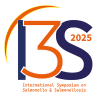Welcome in the section "AUTHORS ZONE"
Abstract submission is now closed!
Many thanks for your contribution.
The Scientific Committee of I3S Congress 2025.
SESSIONS
1. Interactions between Salmonella hosts and microbiota
Chairperson: Isabelle VIRLOGEUX-PAYANT (INRAE, France)
Mikael SELLIN (Uppsala University, Sweden)
Salmonella is a facultative intracellular bacterium found within various phagocytic and non-phagocytic cells and able to infect a wide variety of hosts belonging to the animal and plant kingdoms. The success of host colonization by Salmonella relies on its ability to interact with host cells, to resist the host immune response and to outcompete the microbiota. The session devoted to "Interactions between Salmonella, their hosts and the microbiota" aims to bring together the scientific community working on a variety of hosts and models (at the bacterial, cell, organoid or animal level) and allow them to present their recent findings and discuss future challenges.
2. Antimicrobial resistance and horizontal gene transfer
Chairpersons: Benoît DOUBLET (INRAE, France)
Marie Anne CHATTAWAY (UK Health Security Agency, UK)
Antimicrobial resistance is a main public health challenge worldwide. Fighting this threat is a public health priority that requires a collaborative global approach across sectors. Although most human Salmonella diarrheal infections are self-limiting, invasive infections can occur that require antimicrobial therapy. Over the past decades, emergence of multidrug resistant serotypes of Salmonella have been observed, sometimes including resistances to critically important antibiotics which can cause treatment failures.
This session will focus on the molecular epidemiology of emerging antimicrobial resistant serotypes of Salmonella. All antimicrobial resistance mechanisms will be also considered such as target modification, protection of the target, efflux, decreased permeability, enzymatic inactivation as well as induction of resistance mutagenesis... All horizontal gene transfer mechanisms implicated in the successful spread of mobile genetic elements harbouring resistance genes (plasmids, integrative elements, phages...) will be also of interest as well as genetic defence systems in this session.
3. Risk assessment and source attribution
Chairperson: Laurent GUILLIER (Anses, France)
Francisco ZAGMUTT (EpxiAnalytics, USA)
The impact on risk of control measures for Salmonella applied along the farm to fork chain is the main scope of this session. Communications addressed to this session should deal with concrete examples on control measures or with modelling approaches for exposure assessment, risk characterization. Source attributions models are also welcomed in this session.
4. Ecology, epidemiology and control along the food chain and beyond
Chairpersons: Marianne CHEMALY (Anses, France)
Jose Emilio ESTEBAN (Merieux NutriSciences, USA)
Epidemiological investigations for sampling and tracing Salmonella contamination throughout the food chain and the possible control measures applied are the focus of this session. It covers the contamination of the food chain by Salmonella, from farm to fork and the environment. Communications addressed to this session would deal with the contamination and follow-up of animals, plants and environmental premises, and the control at the primary production, processing and at retail levels. Communications covering emerging serovars in domestic and wild animals are also welcomed in this session.
5. Evolutionary and comparative genomics
Chairpersons: François-Xavier WEILL (Institut Pasteur, France)
Rob KINGSLEY (Quadram Institute Bioscience, UK)
Over the last two decades, microbial genomics has revolutionised our understanding of the diversity, evolution, and function of Salmonella. This session is therefore dedicated to the use of whole genome sequencing to study population structure, phylogeography and evolution of Salmonella populations of interest (e.g., emerging or re-emerging, antimicrobial drug-resistant, ancient DNA and historical isolates, ….).
Beyond genome evolution and comparative genomics, communications can also cover any of the following fields: bioinformatics infrastructure and analysis tools, genomic data and nomenclature, compatibility with former typing methods.
6. Update on reference methods and new alternative methods for Salmonella detection, quantification and identification
Chairpersons: Bertrand LOMBARD (Anses, France)
Kirsten MOOIJMAN (RIVM, The Netherlands)
This session intends to give the latest news regarding expected changes in the ISO reference methods for the detection and identification of Salmonella in the food chain (ISO 6579-parts 1 and 4), as well as regarding innovative (proprietary or non-proprietary) methods that can be used as alternative to the ISO reference methods for Salmonella detection, quantification and identification. Communications proposed for this session should deal with reference methods at ISO, regional or national levels and/or new alternative methods, with a focus on their intended use and degree of validation.
7. Epidemiology and public health
Chairpersons: Nathalie JOURDAN DA SILVA (Santé Publique France, France)
Lesley LARKIN (Public Health Scotland, UK)
Salmonella is an important public health challenge in many countries. Improved surveillance and investigations supported by whole genome sequencing are better defining the nature of the challenge. This session will provide updates on the emerging Salmonella strains, vehicles of transmission, and potential to target improved prevention measures.


